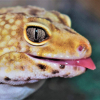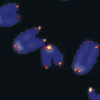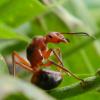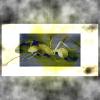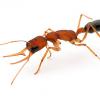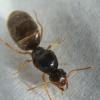Not something my camponotus colony (which is just a queen...) has ever done, but there's one dumb thing i've seen camponotus do in the wild...
So there's a hummingbird feeder outside that's put out for the hummingbirds (shocking, I know), which means it's filled with sugar water. The way the birds access the sugar water is by sticking their beaks into these tiny holes; a pretty standard hummingbird feeder. Anyway, along come some camponotus workers hungry for something sweet, and they start crawling into the holes to drink. Unfortunately, the failed to realize that if they drank too much, they'd be too fat to get out of the holes. Needless to say, I found a few workers who died trying to get out; one of them was in an upright position with just the head and mesosoma sticking out; pretty creepy. So yeah, that's something dumb my local carpenters do.
I don't know if it's THAT dumb ... I've heard stories, and possibly even saw on TV a case of catching monkeys or primates by putting something they REALLY want in a hole (I seem to remember someone doing it with salt). But when they grab it, their hand can't fit back out. Then you can pretty much walk up to them and capture them because they're panicking and yet won't open up their hand to let go. (Definitely sounds like stupid human tricks where people keep doing something even knowing it's dangerous....)
I actually kind of wonder if stupidity can ironically be a sign of intelligence or adaptability? Meaning, if something has to be learned instead of just understood by instinct, it might show the creature has a greater capacity for learning than an equivalent animal that just knows to do things but is less adaptable. But then, that wouldn't really explain Tetramorium's success all over the place. Maybe Camponotus are just dumber.... lol
Past & Present
Veromessor pergandei, andrei, stoddardi; Novomessor cockerelli
Camponotus fragilis, Camponotus sansabeanus (inactive), vicinus, laevigatus/quercicola, CA02
Pogonomyrmex subnitidus, P. californicus (inactive)
Liometopum occidentale (inactive); Prenolepis imparis; Myrmecocystus mexicanus (inactive); Tetramorium sp. (inactive); Lasius sp.
Termites: Zootermopsis angusticollis, and a box of drywood termites that can't be seen
Isopods: (most no longer keeping) A. gestroi, granulatum, kluugi, maculatum, vulgare; C. murina; P. hoffmannseggi, P. haasi, P. ornatus; V. parvus, P. pruinosus, T. tomentosa
Spoods: (no longer keeping) Phidippus sp., other



